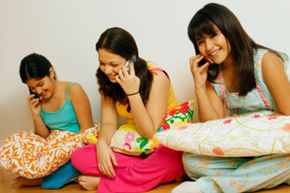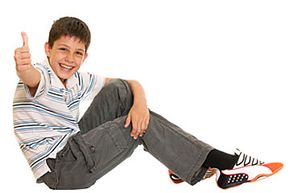Yes, modern tweens love abbreviations, acronyms and phonetic spellings, but they still know the difference between colloquial speech and proper English. Rachel Robertson, a tweenager from south Georgia, admits that while she and her friends frequently use slang in private conversations and messages, they know there's a time and place for it. She says, "We don't care what we sound like while texting because it doesn't really matter. It's not like it's for a school paper or anything. Most of us don't talk that way to teachers, parents or authority figures -- just to our peers."
Even if your tween isn't as courteous as Rachel and speaks to you exclusively in what sounds like letters and half words, you'll probably find that the lingo really isn't all that hard to understand once you know what to look for. Tween slang often follows a pattern of abbreviated ease, most of which stems from frequently repeated words and phrases that are broken down for brevity's sake. For example, take the ever-popular Internet abbreviation "LOL." Its origins are simple: Instead of typing "laugh out loud" every time you chuckle while communicating online, it makes sense to just type LOL. That's why this word has arguably become the most common and accepted Internet abbreviation. Tweens, however, have taken LOL to a whole new level by incorporating it into their daily speech. LOL may be used as an exclamation (LOL!) or a statement (I'm LOLing right now!).
Recently, a changed spelling of LOL has been used as its own separate word: lawl. It's a pseudo-phonetic spelling of the acronym, though that doesn't mean you should expect all the words you hear your tween speak or see him type to have multiple other spellings or variations. If you're unsure about the definition of a word you read in your child's messages, and an acronym doesn't immediately come to mind, try speaking it aloud. You'll probably feel silly, but hearing the word might reveal its meaning.
Some commonly abbreviated teen slang words are:
- 411 - information
- BF - boyfriend
- BF4L - best friends for life
- BRB - be right back
- G2G - got to go
- GF - girlfriend
- H - hardcore
- IDC - I don't care
- IDK - I don't know
- My B - my bad
- NM - nothing much
- OMG - oh my god!
- PAS - parent over shoulder (may also be MAS or DAS -- mom or dad over shoulder)
- ROTFL - roll on the floor laughing
- TTYL - talk to you later
- U - you
Some phonetically spelled slang words include:
- amirite - Am I right? (This is more of a declarative statement than a question -- asking for affirmation for the obvious.)
- gr8 - great
- l8tr - later
- mhmm - OK, whatever
- noice - very nice/excellent
- ohaithar - Oh, hi there! (This is a good-natured colloquial greeting that feigns surprise at seeing someone you know, most often a friend.)
- ppl- people


